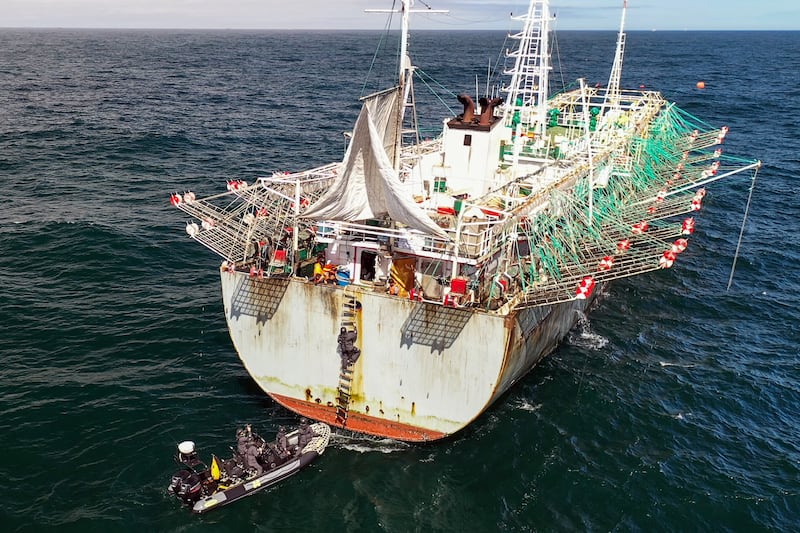MOST reporters get their interviews from knocking doors, phone calls and social media - often writing them up from a comfortable newsroom with a coffee.
But it’s an entirely different story for Ian Urbina, a Washington-based investigative journalist who is more likely to find himself on a speed boat pursuing fishing vessels off the coast of Somalia. Libya or Korea.
Spending 17 years with the New York Times, he started investigating lawlessness on the high seas – charting everything from human rights abuses to murder and human trafficking.
Through charm offensives or even throwing messages in a bottle on board, he finds his way on to ships where workers in grueling conditions and away from land for two years will beg for rescue.

“When I went back the Times after that I was a changed man, so to speak, so I created a journalism non-profit,” he told the Irish News.
Funded through large philanthropies and subscribing readers, the Outlaw Ocean Project specialises in deep dive investigations and documentaries.
Read More:
Fish sold in Irish supermarkets linked to human rights abuses at sea, claims US documentary team
“This current project is unique as it’s much bigger than anything we’ve done before, it took four years with a goal of really taking a close look at the Chinese distant water fleet and the human rights/environmental concerns within it,” he said.
“We do all our own reporting and only do it if we can get on site, which in this case meant getting on the Chinese vessels.
“I did all the reporting at sea, that was in four high seas locations around the world including the Galapagos, the coast of west Africa and the sea border with North Korea.
“It was pretty dramatic stuff. Chinese workers asking to be rescued and really striking conditions.”
Ian said a major goal for the story to have impact was to connect the crime to the consumer.
“This meant we could say to a citizen in Dublin, this is the supermarket that has products coming off ships with abuses.
“That was really difficult to do, but we did it.”

With China processing most of the world’s seafood supply, he said gaining access to processing plants was especially difficult in a country that was “an impenetrable dark box journalistically”.
One way around this was by obtaining mobile phone footage of the conditions from inside Chinese processing plants, where Ian said that Uyghur labourers are at most risk from exploitation.
When interviewees on board ships asked to be rescued, Ian said it was a difficult balancing act.
“That happened on two occasions, one near the Falklands and the other near the Galapagos,” he said.
“I abide by the rules of the New York Times, we never get our interviews through deception. The only way you can get on board is a ship is through an invitation from the captain.
“That usually takes a charm offensive of about a week, maybe with an offer of fresh vegetables and fruit.
“That’s why this takes forever. Once you get on board the captain usually says ‘have at it, you seem like a nice guy. I want the world to know what this work is really like.’”

“I still would have a babysitter following me. But it’s in those few minutes that the babysitter goes for a leak that some crew member will call me into a dark hallway.
“In cases where people ask to be rescued you have to be very careful, because you can’t take him with you.
“We’re not law enforcement. If I told the captain I was taking crew members with me I wouldn’t make it off the ship alive.”
On one occasion off the coast of west Africa, a chinese workers could only pass on the phone number of his family.
“We talked to his sister, a very educated teacher from rural China. She was weeping when we told her we found her brother,” he said.
“She said the whole family had begged him not to go. He was only 17 but had forged papers to say he was 18.
“It’s just this tragic story. We didn’t want to put him at risk by contacting law enforcement, so we asked the family what they wanted to do.
“We warned them about contacting the company as well, in case they made her brother’s time at sea even more difficult.”
He said that so-called “Hollywood rescues” don’t happen, but they were able to alert the US and Chinese embassies to inform them of the realities on board.
He said the deckhands on board were typically trafficked and illiterate people from inland rural China.
“They’re told they’re going to make X amount of money at sea and then they actually get Y. But they do make it home,” he said.
“There’s some violence, but not fatal violence. The tours usually last for two years where they don’t touch land once, which is insane.
“It’s a pretty open secret in China, people are warned ‘do not take these jobs, do not get on a Chinese squid vessel as you’ll regret it for the rest of your life’.”
On whether supermarkets in the UK and Ireland were aware of the products they were getting, he said: “I have yet to come across any western company that we think knew full well. There’s decided plausible deniability, where they may say ‘it’s China so we do what we can by sending in these auditors.’
“But the auditors don’t turn up unannounced, they ask questions in a certain way and know full well that the whole oversight structure is flawed.”
On returning home to normal life afterwards, he said: “My wife would tell you I’m grumpier, my son would probably concur. Honestly, I have an Irish mother and a Puerto Rican father, so I’m through and through raised Catholic and have all the according guilt that goes along with it,” he said.

“So the more I see, the more I feel compelled to keep going along with this beat because I feel it’s so dire and under reported.
“I feel guilty flying back to my posh home and comfortable life. But that motivates me to work harder on it.”








